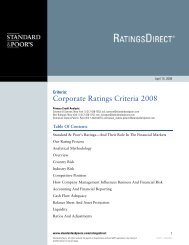European Infrastructure Finance Yearbook - Investing In Bonds ...
European Infrastructure Finance Yearbook - Investing In Bonds ...
European Infrastructure Finance Yearbook - Investing In Bonds ...
You also want an ePaper? Increase the reach of your titles
YUMPU automatically turns print PDFs into web optimized ePapers that Google loves.
standard in U.K. PFI transactions. The creditorfriendly<br />
U.K. insolvency framework gives secured<br />
creditors of PFI transactions with step-in rights<br />
who have floating charges the ability to appoint<br />
an administrative receiver to enforce security and<br />
thereby control the insolvency process.<br />
Additional features supporting substantial<br />
recovery include the relative clarity of the<br />
termination regime (although this remains largely<br />
untested), the expectation of timely repayment by<br />
the Trusts according to defined procedures and<br />
dates, and the robust credit quality of the Trusts<br />
as payers of termination sums. Exposure to a<br />
Trust credit default following termination is,<br />
therefore, minimal.<br />
The PA stipulates the mechanism for<br />
determining how ProjectCo (and its lenders) will<br />
be compensated for various events leading to<br />
termination. <strong>In</strong> the event of a Trust default, force<br />
majeure, or a voluntary termination,<br />
compensation will fully cover senior debt service,<br />
i.e. 100% recovery will be possible. As the Trusts’<br />
responsibility is joint but not several, however, the<br />
PA only terminates for Trust default if the Acute<br />
Trust (representing 86% of the unitary payment)<br />
defaults. If one of the two smaller Trusts defaults,<br />
full compensation is payable to ProjectCo in<br />
standard terms but the PA does not terminate.<br />
The medical equipment services agreement does<br />
not have any partial termination provisions.<br />
A ProjectCo event of default arising from issues<br />
like insolvency, prohibited change of control,<br />
construction delay beyond the longstop date (24<br />
months after the scheduled completion of the<br />
Acute hospital), material breach of obligations, or<br />
accumulation of excessive penalty points,<br />
however, can trigger a termination where the<br />
repayment of debt is not guaranteed by the Trust.<br />
These scenarios have therefore been considered in<br />
order to arrive at potential recovery rates.<br />
STANDARD & POOR’S EUROPEAN INFRASTRUCTURE FINANCE YEARBOOK<br />
PROJECT FINANCE/PUBLIC-PRIVATE PARTNERSHIPS<br />
Senior lenders have step-in rights to resolve a<br />
ProjectCo event of default. If termination occurs,<br />
compensation is based on a market retendering<br />
process (if a liquid market exists) or a net-presentvalue<br />
calculation, less certain expenses.<br />
Recovery rates for the project should improve<br />
as time passes because debt will be paid down<br />
and reserves built up. The recovery analysis<br />
assumes a relatively unfavorable scenario where a<br />
severe delay occurs in the initial years of<br />
construction, with a substantial increase in costs<br />
following contractor replacement. Scenarios that<br />
reduce the unitary payment by various amounts<br />
have also been considered, reflecting ProjectCo’s<br />
inability to achieve its original operating<br />
performance. The liquidity available to the project<br />
through reserves (such as the guaranteed<br />
investment contract) and cash is factored into the<br />
analysis. The recovery scenarios also assume that<br />
both the liquidity facility and the CiLF are fully<br />
drawn at default.<br />
Outlook<br />
The stable outlook on the preliminary underlying<br />
ratings reflects Standard & Poor’s expectation<br />
that construction will proceed in line with the<br />
planned program and budget. This expectation is<br />
based on the contractor’s ability and the<br />
professional team it has assembled, the favorable<br />
opinion of the technical adviser on the proposals,<br />
and the significant third-party construction<br />
support provided. The rating could be lowered if<br />
there were substantial delays in construction-increasing<br />
concerns about the contractor’s ability<br />
to deliver and maintain the hospitals--and/or<br />
substantially higher-than-expected cost increases.<br />
An upgrade in the short to medium term<br />
is unlikely. ■<br />
NOVEMBER 2007 ■ 141



